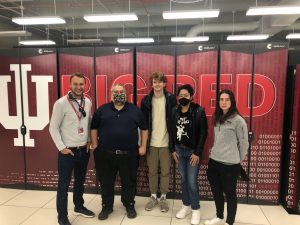 Bloomington is home of the fastest supercomputer in the state of Indiana, and this week Indiana University’s Big Red 200 was host to visitors from IU’s CyberCorps Scholars program. The IU supercomputer, capable of 6 petaFLOPS of processing, is a leap forward in research capability for cybersecurity and AI researchers. It positions IU as a continuing hub of world class research applicable to cybersecurity.
Bloomington is home of the fastest supercomputer in the state of Indiana, and this week Indiana University’s Big Red 200 was host to visitors from IU’s CyberCorps Scholars program. The IU supercomputer, capable of 6 petaFLOPS of processing, is a leap forward in research capability for cybersecurity and AI researchers. It positions IU as a continuing hub of world class research applicable to cybersecurity.
The CyberCorps Scholarship for Service is a national program of the National Science Foundation (NSF) that sponsors students studying cybersecurity and receiving full support in trade for serving in a federal, local, or tribal position after graduation. IU’s CyberCorps Scholarship Program (IUCSP) hosts undergraduate and graduate students in cybersecurity degree programs from the Luddy School of Informatics, Computing, and Engineering as well as from the Cybersecurity Risk Management Program. Program PI’s include Luddy Executive Associate Dean for Undergraduate Education, Esfandiar Haghverdi, Luddy Professor Apu Kapadia, Kelley School of Business Professor Scott Shackelford, and Kelley School of Business Assistant Professor Sagar Samtani.
Touring the facility were CyberCorps Scholars Laura Calloway (PhD), Alicia Freel (PhD), and Brady Anderson (BS) as well as Program Manager Joshua Streiff and Professor Scott Shackelford.
Laura Calloway is a Security Informatics PhD Student with the SPICE Center. She performs research in Professor L.Jean Camp’s Human and Technical Security Lab. Calloway investigates research questions into the ways technology impacts the lives of minoritized groups, the technology literacy pedagogy, issues of tech and consent, and how privacy preserving behaviors can be integrated into internet connected health device usage. Her presentation at the Annual Meeting of Society For Social Studies Of Science in Toronto was entitled Harm Reduction for Internet of Things Devices.
Alicia Freel is a Security Informatics PhD Student with the SPICE Center and performs research in Professor Apu Kapadia’s Privacy Lab. Freel has done clinical cybersecurity work for the United States Department of Defense, including the National Security Agency. She also held an internship with the CyberPeace institute based in Geneva, Switzerland where she worked to improve attribution efforts both internationally and domestically for cyberattacks.
Brady Anderson serves as the vice president of Cybersecurity Club (CSC) at IU which offers a wide variety of technical and non-technical labs. CSC has a large community of undergrads, grads, and industry professionals. Additionally, Anderson is developing a reputation system, Respect, through his startup Prospect XR which will offer an empirical measure of social capital that allows online communities to self govern and make group decisions.
Program Manager Joshua Streiff is the manager of both the SPICE center and the IUCSP. He has been a Co-PI on a CAE Capacity building grant for the DoD/NSA specializing in cybersecurity educational outreach. He runs Indiana University’s Internet of Things (IoT) House and is author of multiple publications in IoT cybersecurity education and is lead on Luddy’s Pre-College summer camps.
PI Scott Shackelford’s research interests center on cybersecurity and policy. His recent paper, Defining ‘Reasonable’ Cybersecurity, is being published by the Yale Journal of Law and Technology, a synopsis can be read in the Council on Foreign Relations. His other recent paper, Cyber Silent Spring, looks at promoting transparency around security and privacy for investors and consumers and it is being published by the University of Pennsylvania Journal of Business Law in 2023.
